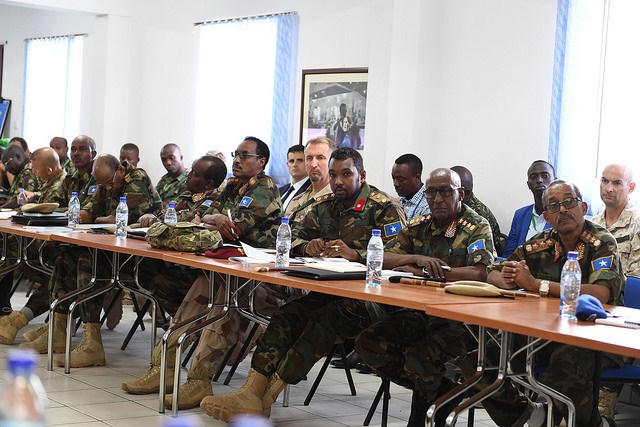
Thursday June 14, 2018
By Mary Harper

Participants attend the opening of a
Joint AMISOM and Federal Government of Somalia (FGS) conference in
Mogadishu, Somalia, on July 24, 2017. AMISOM Photo/ Omar Abdisalan
The government of President Mohamed got a dose of support at an international conference in May, but diplomats worry about its ability to defeat Al-Shabaab
The talk was of a tipping point when some kingpins of African diplomacy descended on Lancaster House in central London to deliberate on Somalia on 11 May. The unanswered question after a day of discussion was: tipping into what?
Britain’s Prime Minister Theresa May opened proceedings with some upbeat claims on Somalia: “Look how far we have come in the last five years.” Piracy had been dealt with, and the Islamist rebels of Al-Shabaab had been “driven out of many of the areas they once controlled” and no longer “pose an existential threat.” United Nations secretary general António Guterres was listening in the front row of attendees, as were AU Commission chair Mahamat Moussa Faki, the presidents of Kenya and Uganda Uhuru Kenyatta and Yoweri Museveni, and Ethiopia’s Prime Minister Hailemariam Desalegn.
It is true that Al-Shabaab has lost full control of many towns. Crucially, it was pushed out of Kismayo, Merca and Brava ports, which had been used to finance much of its operations.
President Mohamed ‘Farmajo’ Abdullahi Mohamed was elected by a small group of officials last year and made hefty promises at the conference, not least the defeat of Al-Shabaab within two years (see interview). Because of the logistical and other challenges in organising a national election, few Somalis were involved in the selection of the new president. But after a relatively successful stint as prime minister, he is a popular figure.
BETTER ALTERNATIVES
But Mohamed’s promises have been made before. After a decade of fighting, Al-Shabaab has proved resilient and adaptable. It still controls vast swathes of Somalia and can attack Mogadishu and many big towns at will. It remains a threat to neighbouring states, especially Kenya. A splinter group linked to the Middle East-based Islamic State rebels operates in Somalia’s north-eastern Puntland state.
Somalia’s new foreign minister, Yusuf Garaad Omar, a former head of the BBC Somali Service, says the government has a realistic plan to defeat Al-Shabaab. It includes beefed-up military tactics, offers of amnesty to defectors and a national security plan to reform the security forces. The government knows that to stop people joining Al-Shabaab it has to offer better alternatives.
It plans to boost the army to 18,000 soldiers, properly paid and trained. And it wants to reform relations between the centre and the new federal states. That plan is risky. Some of the new states trust neither the government in Mogadishu nor the federal troops. They have their own security forces and want to maintain command and control. Resource-sharing between the centre and the regions is yet to be agreed, and Somalia has still not finalised its constitution.
The conference agreed a new security pact that aims to coordinate foreign military assistance far better. A fully coordinated system may not be possible. The UAE, for example, has recently agreed a deal with the self-declared Republic of Somaliland in the north-west to build a military base in the port city of Berbera. Turkey is constructing a vast military facility on the coast south of Mogadishu.
Now, there is talk of the day when 10-year-old AMISOM, the AU peacekeeping force, will be replaced by Somali troops. But recent withdrawals by Ethiopian troops from Somali towns show the fragility of the situation. Al-Shabaab fighters have sauntered back in within hours, slaughtering civilians they accuse of spying for the ‘infidels’.
Land disputes are a growing problem, partly fuelled by returning members of the diaspora. Those who stayed put resent Somalis who swagger in from abroad and grab top positions, often ignoring the complexities of clan politics. The new president, prime minister, speaker of the house and much of the cabinet are from the diaspora.
REMITTANCES
Less controversially, Somalia’s huge diaspora is helping to save lives and rebuild the country through remittances averaging some $2bn a year. They are particularly critical as Somalia’s heavy foreign debt arrears have cut it off from most sources of international finance.
The London conference was useful in so far as it refocused international attention on the crisis and developed a more coordinated roadmap with more input from Somali nationals.
But some Somalis were disappointed. At conference side events, many questions asked were about justice. Why have people been allowed to get away with killings, sexual violence, targeted assassinations and violent land seizures for years? When will they be made to answer for their crimes and how?
Small steps are being taken. In March, the government and the United Nations agreed on the Joint Rule of Law Programme. Even with a modest budget of $8m, it is a start. Mobile courts are already operating in two regional states, Jubaland and South-West.
More widely the test for the new government is whether it will make a difference on those core issues of justice, the economy, peace and security. That is what positive change it can make for the bulk of Somalis who have lived lives of immense difficulty over the past 30 years, many of whom have no idea what peace looks, sounds or smells like.
Mary Harper is Africa Editor for BBC World Service News and author of Getting Somalia Wrong? Faith, War and Hope in a Shattered State (Zed Books). She is now writing a book about Al-Shabaab.